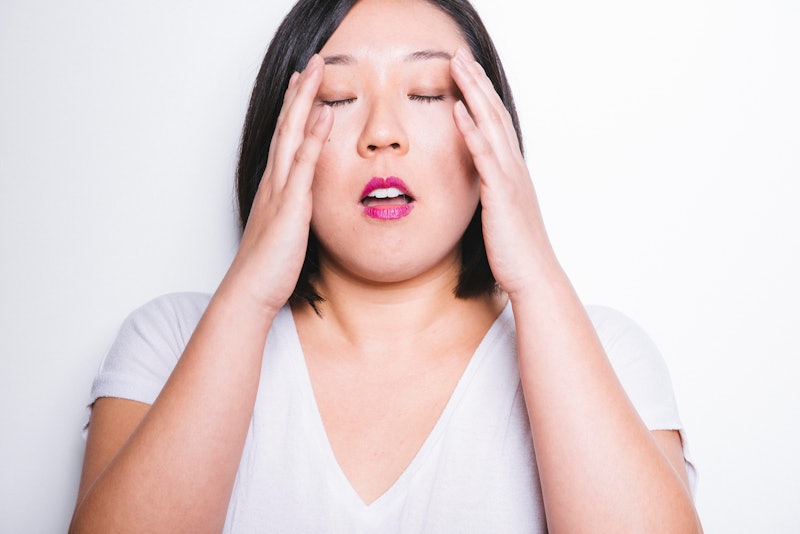Life

It's been known for a while that your mental state can affect your digestive health. The so-called "gut-brain axis" means that stress, anxiety, depression, and other mood issues can cause problems in your gut, from stress-induced inflammation to cramps and bowel problems. The brain and your intestinal and digestive systems are intimately linked — but, as we're now understanding, that link also goes the other way. Science is revealing that what happens in your gut can have a real effect on your mental state, particularly when it comes to mood disorders. And that gives a new insight into how we might treat anxiety and depression in the future — by starting with the gut and working upwards.
If you live with anxiety, you may also be familiar with gut issues. Irritable bowel syndrome, for instance, is strongly linked to anxiety and depression, which can worsen symptoms, explains the Anxiety and Depression Association of America. The range of communication between the gut and the brain is very complex; we know that the gut produces hormones, neurotransmitters and immune system signals that find their way to the nervous system, and vice versa. And if you live with anxiety, these communication pathways could be hacked to make things a bit better for you.
1
The Gut Microbiome Can Affect The Genetics Of Anxiety
The microbiome inside your gut is made up of trillions of different kinds of bacteria, and it turns out that they have a strong effect on your anxiety, too. If you alter the microbiome in somebody's gut, you can induce the symptoms of anxiety.
The gut microbiome is essential to the function of things called microRNAs, a study in 2017 found. They're tiny molecules that affect how we express our genes, and microRNAs in particular have been found to control the expression of genes to do with anxiety and anxious behavior in the brain. Alter gut bacteria, and the microRNAs don't work as well, which causes genes to express in ways that cause anxiety.
2
Your Gut Bacteria Can Influence Nerve Growth
A study has found that there's another way in which the gut can cause anxiety, and it has to do with a protein that helps nerve growth in the brain. A study of mice in 2011 found that when their bacterial gut balance was disturbed, their brains experienced a dip in the protein, BDNF. When the bacteria were sent back to normal, the BDNF went back to normal, too. It's thought that low levels of BDNF have a role in psychological disorders like anxiety, though it's not entirely clear how yet.
3
Yep, Your Bowel Movements Affect Your Anxiety Too
In a 2017, scientists took fecal samples from people with IBS, some of whom had anxiety and some who didn't. They then transplanted the samples into mice. The mice who received the transplants from IBS patients with anxiety started to exhibit anxiety, too. The ones whose donors had no anxiety, or who had received samples from healthy people? They showed no anxiety at all.
It was hailed as a massive step forward for the potential treatment of IBS, because it showed that the gut microbiota that end up in feces have a huge role in IBS symptoms. But it's also got people talking about the possibility of fecal bacteria transplants as a cure for anxiety one day. We're not there yet, but it's an exciting — if slightly gross — prospect.
4
The Pathways From Gut To Brain And Brain To Gut Are Different
A study in 2016 found that things between the gut and the brain run both ways, but along separate tracks. The researchers found that for around a third of people in the study, anxiety preceded gastrointestinal disorder, and for two-thirds, having a disorder like IBS preceded anxiety or depression.
5
Probiotics Can Make A Difference
If you're concerned about the link between gut health and anxiety, science says that taking a probiotic supplement can help. They're blends of "good" bacteria designed to improve gut health, and show serious promise in making the brain gut connection better for anxiety sufferers. Studies have shown that a probiotic treatment can reduce anxiety and depressive symptoms, even helping mood in a to a similar way to anti-anxiety drug Diazepam.
The big news appears to be Lactobacillus plantarum, which is often found in yogurt and probiotic supplements. A 2016 study found that the bacteria affected the nervous systems of zebrafish in ways that could reflect on human brains too. And another showed that gut bacteria therapy could be helpful for people with PTSD.
6
If you experience anxiety, it's a good idea to pay attention to your digestive health and observe the connections between your gut and mental states. While probiotics can potentially be helpful, it's also critical to be in touch with your GP and your mental health support team, to help you manage your mental health from all angles.